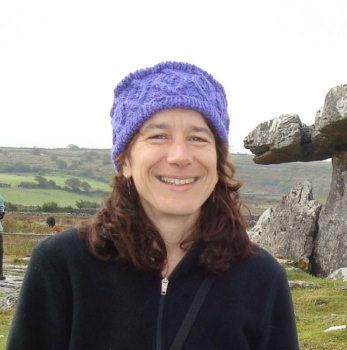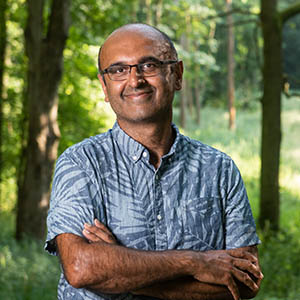Scale and Technology Research Theme
Tracking and evaluating nature recovery at both fine resolution and large spatial scales utilising state-of-the-art remote sensing, big data, and deep machine learning techniques.

About
We aim to harness the big data and the AI revolution to develop innovative technological approaches to assess nature recovery in both fine detail and at large spatial scales.
We are in the midst of an exponential proliferation of data about our environment from sources as varied as a new generation of satellite sensors, social media posts and time-lapse cameras with image recognition. In concert with this data richness, there is immense potential to use AI/machine learning to fuse, interpret and correlate data to work at both fine spatial resolution and large spatial scale in the midst of significant complexity.
For the first time we have the potential to map and model ecological connectivity across whole countries, map different farming approaches or infrastructure in fine detail and track the connectivity of biodiversity associated with different farming landscapes. We will advance state-of-the-art AI approaches to combine different sources of data, including drones, satellite, survey data and social media, that are robust to a range of environmental scenarios, data noise and model reliability.
We will initially focus on three machine learning tasks to address the information requirements of our programmes:
- The exploitation of existing machine learning technology and subsequent identification and filling of methodological gaps
- Novel methods for data interpretation
- Requirements for hardware, imagery and human intervention for cost-efficient, scalable data analytics.
Projects
-
Robust ESG data for biodiversity
Financial institutions are increasingly aware of and interested in biodiversity- and nature- risks and opportunities, but such attempts have often been hindered by incomplete, incomparable and unreliable environment, social and governance (ESG) disclosure and scores.
Team
- View project
Theme outputs
- Society
- Scale and Technology
- Remote sensing
- Society
- Remote sensing
- Scale and Technology
- Awards
- Remote sensing
- Scale and Technology
- Society
- Awards
Zhang-Zheng H; Adu-Bredu S; Duah-Gyamfi A; Moore S; Addo-Danso SD; Amissah L; Valentini R; Djagbletey G; Anim-Adjei K; Quansah J (2024). Contrasting carbon cycle along tropical forest aridity gradients in West Africa and Amazonia.. Nature communications.
Tropical forests cover large areas of equatorial Africa and play a substantial role in the global carbon cycle. However, there has been a lack of biometric measurements to understand the forests’ gross and net primary productivity (GPP, NPP) and their allocation. Here we present a detailed field assessment of the carbon budget of multiple forest sites in Africa, by monitoring 14 one-hectare plots along an aridity gradient in Ghana, West Africa. When compared with an equivalent aridity gradient in Amazonia, the studied West African forests generally had higher productivity and lower carbon use efficiency (CUE).
Kumeh, Eric Mensah. (2023). How agroecology can help build dynamic cocoa agroforests in Ghana.. Agroforestry at work .
This article describes the transformative potential of agroecology as a beacon of hope for reestablishing balance in Ghana’s cocoa-forest mosaic landscapes. Agroecology — rooted in the principles of ecological harmony and sustainable agriculture — offers a way to revive and restore biodiversity, empower farmers and ensure a resilient and thriving future for cocoa farms.
Boonman, C.C.F., Serra-Diaz, J.M., Hoeks, S., Guo, W-Y., Enquist, B.J., , B., Malhi, Y., Merow, C., Buitenwerf, R., Svenning, J-C. (2024). More than 17,000 tree species are at risk from rapid global change.. Nature Communication.
Trees are pivotal to global biodiversity and nature’s contributions to people, yet accelerating global changes threaten global tree diversity, making accurate species extinction risk assessments necessary. To identify species that require expert-based re-evaluation, we assess exposure to change in six anthropogenic threats over the last two decades for 32,090 tree species. We estimated that over half (54.2%) of the assessed species have been exposed to increasing threats. Only 8.7% of these species are considered threatened by the IUCN Red List, whereas they include more than half of the Data Deficient species (57.8%). These findings suggest a substantial underestimation of threats and associated extinction risk for tree species in current assessments. We also map hotspots of tree species exposed to rapidly changing threats around the world. Our data-driven approach can strengthen the efforts going into expert-based IUCN Red List assessments by facilitating prioritization among species for re-evaluation, allowing for more efficient conservation efforts.
News & events
-

Oxford researchers find African forests even more productive than Amazonia.
6 June 2024Whilst most studies on the ecosystem functioning of tropical forests have focussed extensively on Latin America or Asia, researchers at the University of Oxford say comparing findings with studies in Ghana has produced interesting and differing results showing that more studies need to be made in Africa. Tropical forests cover large areas of equatorial Africa […]
news Blog -

Assessing the Potential of AI for Spatially Sensitive Nature-Related Financial Risks
4 June 2024There is growing recognition among financial institutions, financial regulators and policy makers of the importance of addressing nature-related risks and opportunities. Evaluating and assessing nature-related risks for financial institutions is challenging due to the large volume of heterogeneous data available on nature and the complexity of investment value chains and the various components’ relationship to […]
news Report









